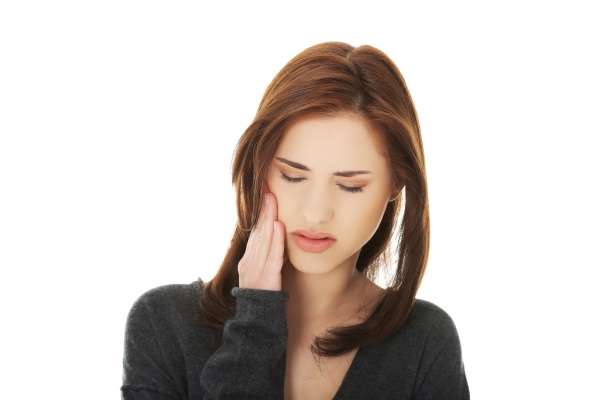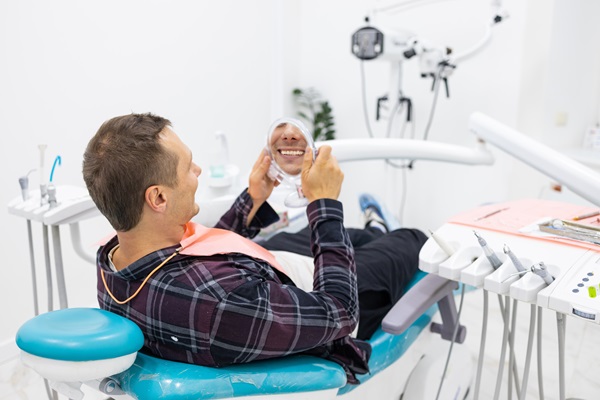What Are the Signs of TMJ?

TMJ (or TMD) stands for temporomandibular joint dysfunction, a disorder that causes pain and limited movement in the jaw joint and the surrounding muscles. A feeling of tiredness in the jaw hinge is often due to overuse when talking, chewing gum or eating. However, TMJ is more than just jaw fatigue and comes with an array of unpleasant symptoms.
In most cases, the exact cause of TMJ in a patient is hard to pin down. Pain in the jaw can be due to a combination of factors, like stress, past jaw injury and even genetics. Certain conditions, such as arthritis, can irritate the jaw, while bruxism, or the clenching and grinding of teeth, puts patients at risk for TMJ as well.
Pain associated with TMJ is normally temporary and can be relieved with over-the-counter pain medications and self-care. If you are experiencing intense jaw pain for a long period of time, surgery may be the best course of action.
Signs of TMJ
Sustained pain or tenderness in the jaw
Pain in one or both of the jaw joints, along with the surrounding muscles, is one of the first complaints from patients with TMJ. Most adults experience discomfort related to jaw movement at least once. When that sensitivity feels limiting in daily life and makes eating and speaking painful, it may be time to discuss TMJ treatment with your dentist.
Aching pain around and in the ear
This pain can come on suddenly and radiate for a time before subsiding. Since the jaw hinges and muscles are located in such close proximity to the ears, this unpleasant feeling can be connected to TMJ. Aching pain in the face, near the cheeks, may also be present during fits of TMJ.
Difficulty chewing
TMJ can also cause limited movement of the jaw. Pain while chewing means that your jaw muscles are working extra hard to help you chew.
Lockjaw
This symptom is the most severe and is usually rare. The hinge locks in place, making it difficult to open or close the mouth.
Clicking sound when moving the jaw
In combination with a few of the above symptoms, a clicking sound and a grating sensation can confirm TMJ. However, if there is no pain or limitation of movement accompanying the clicking or grating, you likely will not need treatment.
Risk factors for TMJ
Those with rheumatoid arthritis and osteoarthritis are at a heightened risk of developing symptoms of TMJ. When the disk erodes or moves out of alignment, painful TMJ may occur. Cartilage damage is another defining factor in limited jaw movement. TMJ due to jaw injuries will sometimes need restorative surgical treatment.
The muscles in the back and neck are closely connected to the facial and jaw muscles. For this reason, the cause of your TMJ might simply be due to stress. Muscle knots in the upper back can pull on the facial muscles, straining them and causing limited movement. The first line of defense against TMJ is stress relief techniques. After this, hot and cold compresses in succession may help relieve swelling and pain in the area.
Let's get started
Request an appointment here: https://www.emersondental.com or call Emerson Dental Associates at (201) 620-9998 for an appointment in our Emerson office.
Check out what others are saying about our services on Yelp: Read our Yelp reviews.
Recent Posts
When considering full mouth reconstruction to restore oral health, it is important to learn about the process, including the choice to make. When multiple dental issues are present, a full mouth reconstruction is usually the best procedure to correct the problems and restore oral functions and one's appearance. Since there is a lot of information…
Dental implants are a great way to replace multiple missing teeth. A dental bridge is also a solution for multiple teeth replacement in many cases as well. By learning more about the pros and cons of each option, it will help you decide which treatment option is right for you. Missing teeth create a cosmetic, functional…
No one looks forward to tooth extraction, but sometimes it is necessary for a person's oral health. This is often the case with the last adult teeth to erupt, the wisdom teeth. Many people need to have one or more of their wisdom teeth removed because they are not coming in right, there is not…
Preventive dentistry involves using the right products. This includes selecting the right toothpaste. There is a type of toothpaste for every person. If you want to enhance your preventive dentistry brushing strategy, here are some tips on choosing the right toothpaste.The attending dentist will be the judge of the most suitable toothpaste. The dentist knows…


